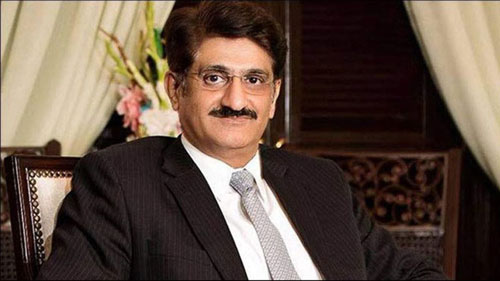Sindh Chief Minister Syed Murad Ali Shah in his virtual meeting with the World Bank team, headed by its Country Director Naijy Benhassine, discussed a five-component $400 million Sindh Human Capital Investment Project.
The Sindh government and the World Bank agreed to finalization of the project by completing its remaining documents so that it could be started from next financial year.
The chief minister was assisted by provincial ministers, Dr Azra Fazal Pechuho, Ismail Rahu, Saeed Ghani, Nasir Shah, Sohail Siyal, Chairperson P&D Shireen Narejo, Principal Secretary Sajid Jamal Abro, Commissioner karachi Naveed Shaikh, Secretary Finance Hassan Naqvi, Secretary School Education Ahmed Bux Narejo, Secretary Local Govt Najam Shah, Secretary Health Kazim Jatoi, Secretary Agriculture Raheem Soomro and others.
Sindh Human Capital Project is a $400 million comprehensive scheme in which the World Bank would finance 85 percent budget and the provincial government would share 15 percent funds.
The chief minister said that it would be called Sindh 1000 days plus program aimed at further strengthening the continuum of care for Integrated Healthcare Services for Universal Health Coverage.
He added human capital formation would be made through integrated health, early child education, adult literacy, skill development for women economic inclusion and a social registry. “We are conducting environmental and social impact assessment,” he said.
Shah said that selected interventions would be implemented through Public Private Partnership (PPP) such as social registry, skills development, ambulance, microfinance, telehealth and others.
The CM discussing the details of the project said that out of 30 districts, 271 underserved union councils selected.
“The selection is based on hard-to-reach and remoteness in terms of desert, delta, riverine, hilly, nara, Achro Thar and arid zone,” he said.
According to Shah, out of total 1093 government dispensaries (GDs), 293 were selected on the criteria based on two factors – the GD located at four kilometres distance from a Basic Health Unit (BHU) and the GD which has no coverage of Lady Health Workers.
“On average each GD is nine kilometers away from a BHU,” he elaborated and added during first of launching the programme, 93 GDs located in five districts- Tharparkar, Thatta, Sujawal, Jamshoro, Qambar-Shahdadkot would be covered, while rest would be covered after one year of the initial programme.
It was pointed out that according to a research conducted in 2017-18, a distance from a health facility was one of the major reasons for not seeking healthcare.
This barrier is more profound in terms of adolescents, widowed, divorced, remote areas, un-educated women and lowest wealth quintile, the study saud.
The study says the children who live at a distance of five kilometres from a facility are 17 percent more at risk of mortality. Distance is the most important factor that influences the utilization of health services.
At this the chief minister said that in Sindh, a functional facility (BHU) was on average nine kilometres away from a GDs – facility closer to the community.
Pechuho said that 293 dispensaries would cover a population of 9.744 million. The GDs would be integrated with district health systems such as DHQ, THQ, RHC and BHU through 88 ambulances, meaning one ambulance for a cluster of five dispensaries.
Components: There are two components of the project, The Reproductive, Maternal, Newborn and Child Health (RMNCH) of $203 million and formation of medical Record System of $2 million.
The baseline survey would be conducted during the firts year of the project. The refurbishment and branding of 392 dispensaries, of them 93 during the first year, as Sindh Peoples Health Centres (SPHC).
In the GDs 1,176 Community Midwives, 130 Women Medical Officers, each for a cluster of five GDs, and 392 Family Welfare Workers (FWWs) would be posted.
Apart from them 3,690 Community Health Workers from the local community’s young and energetic women would be hired for the dispensaries.
A women community hall for telehealth facilitation, women empowerment and skill development would also be established in the GD. Social mobilization for social registry and medical record system would also be made.
There would be outreach services for screening, family planning counselling, nutrition, and immunization.
Under the project there would nutrition services for mother and child, family Health Day for Family Planning at GD, Delivery Services, ANC, PNC, PPFP, Immunization Services, Referrals for an integrated health system, IT units for Medical Record system at the Facility, District and Provincial level, Registration of mother-child dyad.
Early Child Education: The component three of the project includes early child education, learning and skill development for adolescent girls. It is a $55.9 million component, said Secretary P&D Shireen Narejo.
Under the components of school infrastructure and community support for Early Child Education (ECE) to Improve equity, access, school readiness and retention would be enhanced and expanded.
Social Protection: This social protection for women and girls economic inclusion and empowerment based on socio economic components of the project would cost $126 million.
Under the scheme, development of a social registry would be ensured. The chief minister elaborating social protection said that the economic empowerment of women and girls would be made through financial literacy, skill development, micro-financing and training as community health workers
He said that Islamic Development Bank (IDB) has shown interest in social protection and it would incorporate it in PC-1 under a partnership component.
Workers support: The chief minister said that under this $3.9 million support, health and population workers and communities would be supported during COVID-19 and other natural disasters.
Under the scheme, telehealth services would be established and promoted. Self-care as an approach during and after COVID situation for health education, hygiene, family planning. The frontline workers on COVID/ disaster response would be trained.
The World Bank team discussed each and every component in the meeting and agreed to finalize the remaining documents and approvals so that it could be started from next financial year.










